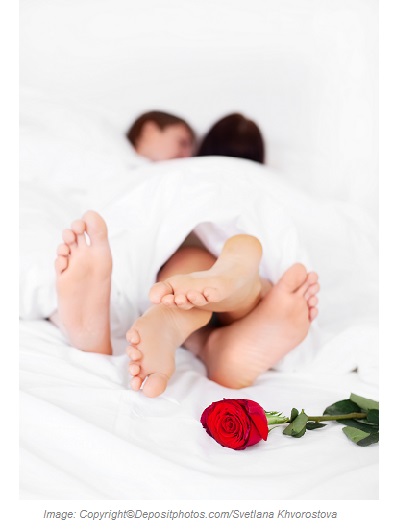Dyspareunia is genital pain experienced by a woman or man before, during, or after
 sexual intercourse. It is more common in women than in men, affecting 25% of women. Painful intercourse prevents from feeling ultimate sexual pleasure.
sexual intercourse. It is more common in women than in men, affecting 25% of women. Painful intercourse prevents from feeling ultimate sexual pleasure.
Women may complain of pain, voluntary guarding and involuntary high muscle tension at the moment of penetration or in deep entry. Men may experience pain in the testicles and at the moment of ejaculation.
Potential contributing risk factors in women:
- Psychological factors:
- Anxiety.
- Depression.
- Troubled relationships.
- Emotional stress.
- Flashbacks of previous sexual abuse or domestic violence.
- Physical factors:
- Endometriosis.
- Ovarian cysts.
- Chronic yeast infection (Candidiasis).
- Postmenopausal.
- Chronic nonbacterial inflammation of the bladder (interstitial cystitis).
- Pelvic inflammatory diseases.
- Urinary tract infections.
- Sexually transmitted diseases.
- Tumors.
- Genital infection by herpes simplex virus.
- After radiation therapy to the area.
Potential contributing risk factors in men:
- Psychological factors:
- Anxiety.
- Depression.
- Troubled relationships.
- Emotional stress.
- Flashbacks of previous sexual abuse or domestic violence.
- Physical factors:
- Inflammation of the prostate gland.
- Chronic nonbacterial inflammation of the bladder (interstitial cystitis).
- Sexually transmitted diseases.
- After radiation therapy to the area.
- Anatomical deformities of the penis.
- Scarring after inflammation.
- Inflammation or infection of the epididymis, seminal vesicles, and vas deferens.
Nutritional Supports:
Restricted Foods:
- Sugar and sweets. They could lead to overgrowth of candidia albicans.
- Foods high in yeast and mold: beers, aged cheese, dried fruits, melons, and peanuts.
- Dairy products: cheese, and milk.
- Saturated fats.
- Alcoholic beverages.
- Carbonated beverages.
- Refined foods.
- Caffeine.
- Salt (too much).
Recommended Foods:
- Drinking plenty of water: at least 2 liters a day.
- Whole grains.
- Legumes: lentils and beans.
- Lean protein: fish, turkey and chicken.
- Fresh vegetables.
- Flaxseeds.
- Foods high in magnesium: nuts, seeds, and spinach.
- Soy products.
- Wild yam.
- Garlic.
- Basil.
- Peppermint.
- Rosemary tea.
- Ginger.
- Evening primrose oil.
Recommended Supplements:
- Magnesium: 400 mg a day. This mineral promotes relaxation.
- 5 – HTP (5 – Hydroxytryptophan): 50 – 100 mg a day. It elevates mood and relieves anxiety by increasing serotonin level.
- L – Tryptophan: 1000 – 1500 mg a day. This amino acid eases nervousness and may help with depression.
- Omega – 3 Fatty Acids: 2 – 3 grams a day. They promote calmness.
- Black Cohosh Extract: 160 – 320 mg a day. Black cohosh contains triterpene glycosides (acetin and 27-deoxyacetin) and isoflavones and may help with symptoms of menopause, painful menstruation and painful intercourse. Caution: black cohosh should not be used during pregnancy and breastfeeding.
- Dong Quai Extract: 500 – 1500 mg a day. This herb has an adaptogenic effect and may help reduce pain and discomfort during intercourse.
- Vitamin E: 400 – 800 IU a day.
- French Maritime Pine Bark Extract: 100 – 200 mg a day. It improves blood circulation to the area and also reduces inflammation.
- Multivitamin – Multiminerals: A high potency product.
Miscellaneous Suggestions:
- Liver detoxification.
- Colon cleansing.
- Yoga.
- Acupuncture.

